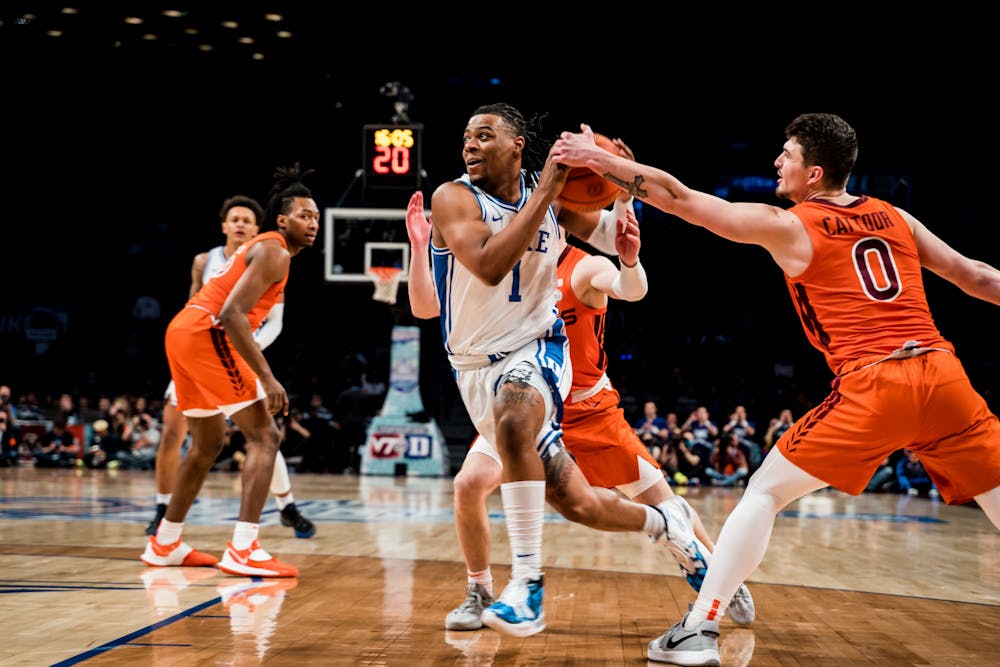BROOKLYN, N.Y.—Right now, the questions are unavoidable.
With Virginia Tech snatching the automatic bid via its ACC tournament final victory against Duke, the ACC sent five programs to the NCAA tournament. No. 2-seed Duke, No. 8-seed North Carolina, No. 10-seed Miami and No. 11-seed Virginia Tech were locks, while Notre Dame snuck into the First Four in Dayton.
That marks the fifth-most teams in March Madness from a single conference, slotted in behind the Big Ten, the Big East, the Big 12 and the SEC. Each of those four conferences are currently vastly superior to the ACC at the top and depth wise, indicating that the conference that once boasted a first-class trifecta of No. 1-seeds is now stuck in coach.
As anticipated, once the league convened in Brooklyn for the 68th edition of the ACC’s crown jewel, the backsliding reputation of the conference was a constant topic of discussion.
Some head coaches, such as Wake Forest’s Steve Forbes, dismissed the notion and chalked it up to a few unexpected teams rising to the top.
“I think it's because Miami and Wake Forest and Notre Dame are in the top five, and it's not the typical teams that you see in the top five every year, so I think it's just the narrative that we're not as good a league because those teams are not in the top five,” Forbes said Wednesday.
Others, like Duke’s Mike Krzyzewski, acknowledged the whispers and chalked the conference’s struggles up to dubious displays in nonconference action.
“You got to do well in the nonconference, and we didn't do well in the nonconference, and we're paying a price for it. I just wish there was a little bit different way of looking at the whole thing,” Krzyzewski said after the Blue Devils’ 80-76 semifinal win against Miami.
By “different way”, Krzyzewski was referring to, if I can paraphrase, an overreliance on the computer metrics. KenPom, NET and Bart Torvik have become part of the lexicon for close observers of college basketball, and that’s mostly a good thing.
But Krzyzewski has a point. Metrics are only part of the puzzle, and that puzzle also needs to include just sitting down and watching the tape. This is basketball, after all. Not a math test.
“So the numbers playing against each other—if you get good numbers—I'm fairly good in math. I'm not good in English,” Krzyzewski said Friday with a chuckle. “If you get good numbers in your nonconference for conference teams, then playing each other gives you better numbers. Does that make sense? If you do not have good numbers and you play each other, even though those teams are really good, you don't get the good numbers? That's, to me, the fallacy in it.”
The internal solution, then, is simple. Schedule tougher out of conference. Per TeamRankings, only Duke (ninth), North Carolina (14th), Virginia Tech (29th) and Notre Dame (31st) were in the top 50 nationally in non conference strength of schedule. Miami, at 54th, was not too far behind, meaning that the teams with the hardest slates in November and December were the ones who got into the NCAA tournament field. Funny how that works.
Virginia and Louisville have captured national titles in the past decade, the latter of which came when the Cardinals were a member of the old Big East and is technically vacated. Florida State, a self-proclaimed “New Blood”, has reached three straight Sweet Sixteens under head coach Leonard Hamilton. Syracuse, despite a 16-17 mark this season, is led by the man with the second most wins by a men’s college basketball coach ever.
Those four programs I just mentioned are all terrific ones. Time to schedule like it.
Miami head coach Jim Larrañaga raised another valid query Friday. Larrañaga, who has presided over a program subject to an FBI investigation and subsequent exoneration, along with a stark dip in recruiting, was pretty frank when asked whether the ACC has a “perception problem” by Rivals’ Conor O’Neill.
“I definitely think so,” Larrañaga said. “The issue with our league, and I wish everybody could understand that we’re much different than almost every other league because of the number of terrific, great talent we have in the younger classes that leave.”
Such is life in college basketball.
Player mobility, an undoubted positive, is only going to increase, particularly now that the NCAA, as of last April, allows men’s basketball athletes to transfer once without having to sit out a year. Transfer stars, like Kentucky’s Oscar Tschiebwe and Baylor’s James Akinjo, are the future.
That means it’s time for the ACC to fully join the party. Wake Forest and Virginia Tech have done an outstanding job of adding talent through the portal, with experienced studs like ACC Player of the Year Alondes Williams, Demon Deacon forward Jake Laravia and the Hokie duo of Keve Aluma and Storm Murphy leading the charge for their respective teams.
North Carolina head coach Hubert Davis even went new-school, bringing in Oklahoma sharpshooter Brady Manek. Plus, Krzyzewski, who never had a graduate transfer until Patrick Tapé last season, added Theo John and Bates Jones, from Marquette and Davidson, respectively, to help out on the glass.
The trend is clearly growing within the conference. Now it’s time to fully embrace it and keep digging for transfer studs. Duke stockpiles hotshot freshmen every year, but to win in today’s era, you need a blend of ace youngsters and hungry veterans, many of which can be found in the portal.
Then there’s the actual venue of the ACC tournament. The event is no stranger to rotating locations, going from Atlanta to Washington to Tampa, Fla., over the years. Yet there has been an outcry from traditionalists regarding Brooklyn as a host venue.
As our very own Shane Smith outlined a year ago, Greensboro, N.C., will always be the spiritual home of the event, and that’s fantastic. The ACC tournament clearly means way more to Greensboro than it does to Brooklyn.
Besides, New York already has the Big East tournament over at Madison Square Garden. The ACC, the conference of Michael Jordan and Tim Duncan, of Dean Smith and Mike Krzyzewski, should always be the main event.
Brooklyn, though, does have its perks. It is New York, after all.
“I think every basketball player in the world, not in the United States but in the world, would love to play in what is considered the basketball mecca of the world in New York City,” Hamilton said Wednesday.
There is also the Barclays Center, minted in 2012 and home to the Nets. The Garden will always be the basketball capital of the city, and the world, but a pro venue always adds a layer of excitement. Especially for the players.
“I watched this arena on TV all the time, Kevin Durant and everything. It really means a lot to me to know that I can maybe probably be in this position one day every game. It's just really nice,” Boston College guard DeMarr Langford said last Tuesday.
Having sat in the stands during Friday night’s North Carolina-Virginia Tech semifinal, the atmosphere was not quite raucous but definitely enjoyable.
New York is also home to the event’s title sponsor, New York Life, and it might be more appealing for national media members and fans of lower-seeded teams to make the trip. Clearly, there are pros to Brooklyn being in the rotation.
“I think we have to be open to moving it around, potentially,” ACC Commissioner Jim Phillips said in a Q&A with The Athletic last week. “But to what frequency? I don’t know what that means. I can’t define right now what moving around means. Is that once every 10 years? Or is that a once-every-three-years type of rhythm?”
With Greensboro and Washington hosting the next two ACC tournaments, 2025 is the first open year on the calendar. Decisions have to be made.
That being the case, there should absolutely be an emphasis on Greensboro over the next decade—in my view, five of the next 10 events should be in the Gate City. Just one of the last five that have actually taken place in full have been in Greensboro, and that’s a crying shame.
But sprinkling in Brooklyn, Washington, Charlotte and Atlanta can shake things up and satisfy different fan bases and other interested parties.
In short, the ACC clearly isn’t in the best of spots right now when it comes to men’s basketball. When Krzyzewski’s career comes to a close, the spotlight on the conference will be even further dimmed.
But there are ways to bring the magic back. It will just require some evolution.
Get The Chronicle straight to your inbox
Signup for our weekly newsletter. Cancel at any time.

Max Rego is a Trinity senior and an associate sports editor for The Chronicle's 118th volume. He was previously sports managing editor for Volume 117.

